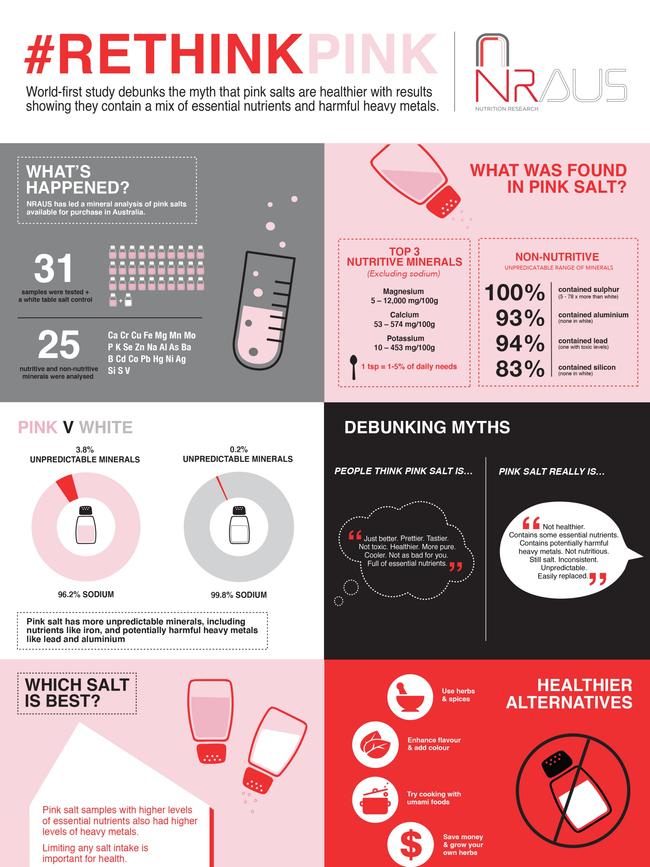How pink salt could be damaging your health
It’s promoted as the healthy option, but a new study has found pink salt isn’t all it’s cracked up to be. In fact, it could even cause serious long-term harm.
National
Don't miss out on the headlines from National. Followed categories will be added to My News.
EXCLUSIVE
It is one of the trendiest items on health food and supermarket shelves, but some brands of pink salt have been found to contain toxic levels of lead and other harmful heavy metals.
The salt, which is promoted by health websites because it contains more minerals, sells for up to $10 a pack — three times the price of the white stuff which retails for as little as $3.
However an alarming study found the level of healthy minerals in the salt were so low you would need to eat six teaspoons of salt a day, six times as much as the World Health Organisation (WHO) says is healthy, to get any benefit.
And worse of all, pink salt could actually be harmful to your health.
Nutrition Research Australia tested 31 samples of pink salt and found one brand – Peruvian Pink Salt – contained so much lead it exceeded Food Standards Australia New Zealand’s (FSANZ) safe levels by 25 per cent and had 130 times more lead than white table salt.
According to US Food and Drug Administration guidelines “one teaspoon of Peruvian salt would be four times the daily limit of lead for a child,” researcher Flavia Fayet-Moore told News Corp.

There is no level of exposure to lead without harmful effects, she said. Young children, including unborn babies, are at greatest risk from lead exposure and it can permanently damage their brain and affect their intellectual development.
Symptoms of lead poisoning include muscle pains, fatigue, abdominal pains, headache nausea and vomiting, seizures and coma.
Other brands of pink salt were found to contain heavy metals that are dangerous if consumed long term.
These included mercury, cadmium and aluminium.
Although these heavy metals were present in only tiny amounts they accumulate in the body as we age and can be toxic if consumed regularly, Ms Fayet-Moore said.
“It could accumulate and result in adverse health effects,” she said.
Cadmium is stored in the liver and kidneys and is slowly excreted in urine but if it builds up it can affect the kidneys, lungs, and bones causing stomach irritation, abdominal cramps, nausea, vomiting and diarrhoea, headaches and flu-like symptoms.
Aluminium has been detected in the brain tissue of patients with Alzheimer’s disease and may reduce the rate of growth of brain cells.

Ms Fayet-Moore wants Australians to “rethink pink” and reduce the amount of all salt they consume including the white stuff.
“Our study shows that pink salt’s reputation for being ‘healthier’ has now been debunked, with the nutrient level too low and variable for it to be a consistent source of nutrients,” she said.
“While pink salt may look prettier on the dining room table, there are many healthy ways to enhance flavour and add colour to your meal, such as using herbs and spices like paprika, turmeric, cinnamon, saffron and even pink peppercorns,” she said.
The World Health Organisation says we should consume less than 5g or one teaspoon of salt per day but because it is in high levels in packaged foods, even sweet foods, most people consume 9-12 grams per day.
Foods with healthy salt levels contain less than 120mg of sodium per 100g.
Originally published as How pink salt could be damaging your health

